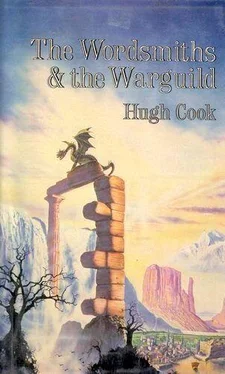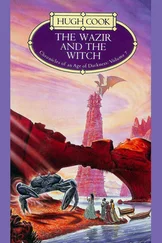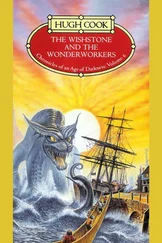Hugh Cook - The Wordsmiths and the Warguild
Здесь есть возможность читать онлайн «Hugh Cook - The Wordsmiths and the Warguild» весь текст электронной книги совершенно бесплатно (целиком полную версию без сокращений). В некоторых случаях можно слушать аудио, скачать через торрент в формате fb2 и присутствует краткое содержание. Жанр: Фэнтези, на английском языке. Описание произведения, (предисловие) а так же отзывы посетителей доступны на портале библиотеки ЛибКат.
- Название:The Wordsmiths and the Warguild
- Автор:
- Жанр:
- Год:неизвестен
- ISBN:нет данных
- Рейтинг книги:4 / 5. Голосов: 1
-
Избранное:Добавить в избранное
- Отзывы:
-
Ваша оценка:
- 80
- 1
- 2
- 3
- 4
- 5
The Wordsmiths and the Warguild: краткое содержание, описание и аннотация
Предлагаем к чтению аннотацию, описание, краткое содержание или предисловие (зависит от того, что написал сам автор книги «The Wordsmiths and the Warguild»). Если вы не нашли необходимую информацию о книге — напишите в комментариях, мы постараемся отыскать её.
The Wordsmiths and the Warguild — читать онлайн бесплатно полную книгу (весь текст) целиком
Ниже представлен текст книги, разбитый по страницам. Система сохранения места последней прочитанной страницы, позволяет с удобством читать онлайн бесплатно книгу «The Wordsmiths and the Warguild», без необходимости каждый раз заново искать на чём Вы остановились. Поставьте закладку, и сможете в любой момент перейти на страницу, на которой закончили чтение.
Интервал:
Закладка:
To return to our unkind traveller, who so maligned the unfortunate land of Sung, it has now been demonstrated that there was no truth to his claim that the kingdom of Sung was badly goverend. His statement was not just untrue but impossible, for, as there was in practice no such thing as "the kingdom of Sung," the question of its governance did not arise.
The traveller, out of ignorance or malice, made another mistake when he claimed that the main amusements in the kingdom of Sung were scavenging gorse, drowning in peat bogs and playing at fumble in the smothering fog.
The non-existence of the kingdom in question has already been amply demonstrated, which in itself serves to prove the allegation false. Assuming that the traveller was speaking of that eastern part of the Ravlish Lands commonly known as "Sung" scarcely improves matters, for the statement would still be false both in its substance and its implications.
The traveller's accusation implies that Sung was a dull, foggy area domianted by gorse and peat bogs and inhabited by dull, provincial people at a loss for any reasonable form of entertainment.
Nothing could be further from the truth.
As a matter of fact, less than seven percent of the arable land was covered with gorse; in contrast, horse thistle, gripe and barbarian thorn accounted for twenty-two percent between them, with another twelve percent being dominated by snare, clox and blackberry. Overall, only three percent of Sung was peat bog, a full fifty percent being bleak-rock uplands, or trackless forests where ravening wolves would ravage the unwary, leaving the stripped skeletons to become bones of contention between bad-tempered porcupines and rabid foxes.
And to say that Sung was foggy! That was ridiculous. Foggy days were few and far between, there being only ten days of fog a year, compared to 275 days of rain. Water is essential to life, so the inhabitants of Sung were particularly favoured and fortunate, for they were copiously supplied with this commodity, which was delivered free of charge or taxes.
Let is also be known that, contrary to the traveller's declaration, the amusements of the people were many. The principal pastimes were hunting, feuding, fighting and fornication. Drinking and gambling were also very popular, and, on occasion, the people found time for dancing, music and banqueting.
The inhabitants of Sung had their own unique cultural heritage, the intricacies of which were seldom appreciated by outsiders; it included lively games such as "Stone the Leper," and detailed religious rituals such as those laid down for strangling unwanted children and disposing of aged relatives.
Clearly, the unkind traveller whose comments have been the subject of this analysis did Sung a great wrong when he slandered it so unforgivably.
So who was he, and what were his motives?
The disgruntled traveller was none other than the renegade wizard of Drum, who lived on a high and barren island in the dangerous strait separating the continent of Argan from the Ravlish Lands. The wizard of Drum had passed through Sung frequently on his various peregrinations, and, for one reason or another, had never been very pleased with his reception.
Once, indeed, he almost became the victim of a game of "Stone the Leper," which was unfortunate as his incontinent reaction left fifty people dead and an entire village in smouldering ruins. It must be admitted, also, that the wizard of Drum was one of the victims of the Devaluation, which occurred shortly after he had been paid 5,268 punts for work he had done for the Wordsmiths and the Warguild. After that incident, he swore never again to have anything to do with Sung, or even to set foot in the place.
The Devaluation, which ruined many people, was the direct result of swine fever.
While the kingdom of Sung was at best a legal fiction, and the king of Sung little more than a handy butt for the jokes of his people, the currency issued by the king had for many years enjoyed great respect and stability.
King Skan Askander was passionately interested in pigs, which he bred on a large scale. The currency he issued was backed up pork, and consisted of elegant ceramic dials marked "one rasher," "five rashers" or "fifty rashers," and of thin bronze disks which each declared that "This Punt Will Be Redeemed By The Royal Exchequer For One Side Of Bacon."
Then came the great swine fever epidemic of the year Askander 32. In the consequent and inevitably Devaluation, a punt became worth a single rasher of bacon, and the minor ceramic coins became worthless. Hence the wrath of the wizard of Drum, who, besides being rather partial to pork, had seven hungry dragons to feed.
While the wizard of Drum had nothing good to say of Sung, there was some good that could be said of it. There were no droughts and no deserts; the land was free from scorpions and crocodiles; nobody died of thirst and nobody of heatstroke; there were no forest fires, and there was virtually unlimited stone for building with.
Furthermore, despite the weakness of the king, the ferocity of the barons, the strictly parochial interest of the city states and the local penchant for feuding and fighting, the land was protected by a rough and ready form of law and order administered by the Warguild. This wizard of Drum once described the Warguild as a club for the promotion of amateur archery; while it is true that the Warguild held archery contests with wine and women as the prizes, there was much more to it than that.
The Warguild was a league of the most aggressive barons who had made a mutal defence treaty to protect the realm. It had been formed thirty years previously when the land had been plagued by bandits and warlords; having routed out those nuisances, the Warguild now occasionally exercised itself by undertaking mercenary forays, or by serving as guards with Galish convoys.
Many Galish convoys passed through Sung, as the main long-distance trading route, the Salt Road, ran through the land. Furthermore, convoys often wintered in Sung. The Galish found it attractive first and most importantly because the king was too weak to levy any residency taxes, and, second, because the local patois was a form of Galish, albeit much modified. Indeed, some generations previously, this land had been colonised by a number of Galish convoys at a time when war, plague and famine had made trading particularly difficult. The lifestyle of the inhabitants of Sung was now wildly different from that of the Galish traders, to put it mildly, but, when they spoke, they still found each other mutually intelligible.
If there had been any problems in understanding then the Wordsmiths, now busy perfecting their command of all known languages, could surely have translated. The Wordsmiths, an organisation slightly oder than the Warguild, had formed their alliance shortly after the discovery of the odex, which, in the year Askander 35 – three years after the Devaluation – was held in the Wordsmiths' stronghold in a city state in the mountains, a town known as Keep, which boasted a population of a full 5,000 souls.
Not far from Keep was the estate of Baron Chan Poulaan, who, on a certain night in the season of autumn, was keeping a close eye on his son Togura, who was dancing with the girl Day Suet. Now the Suets were a family from Keep, a powerful banking and trading family which actively supported the Wordsmiths. Baron Chan Poulaan, head of the Warguild, considered himself to be, in some respects, the de facto ruler of Sung; he was suspicious of traders, bankers and of the Wordsmiths, and saw the family Suet in partciular as a potential rival for influence and power.
At this stage, it is worth noting that the palace of King Skan Askander lay close to the city state of Keeep. The Suets were, therefore, in a good position to make a grab for any residual power commanded by the royal family. It was said that one of the boys of the Suet family was bravely romancing the king's daughter, Slerma, who, at sweet sixteen, was alleged to weigh in at sixty bushels.
Читать дальшеИнтервал:
Закладка:
Похожие книги на «The Wordsmiths and the Warguild»
Представляем Вашему вниманию похожие книги на «The Wordsmiths and the Warguild» списком для выбора. Мы отобрали схожую по названию и смыслу литературу в надежде предоставить читателям больше вариантов отыскать новые, интересные, ещё непрочитанные произведения.
Обсуждение, отзывы о книге «The Wordsmiths and the Warguild» и просто собственные мнения читателей. Оставьте ваши комментарии, напишите, что Вы думаете о произведении, его смысле или главных героях. Укажите что конкретно понравилось, а что нет, и почему Вы так считаете.












